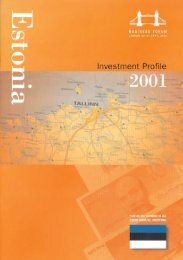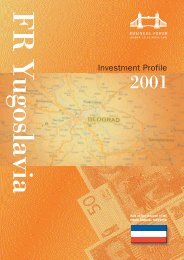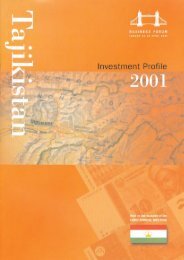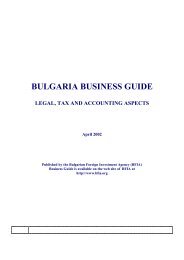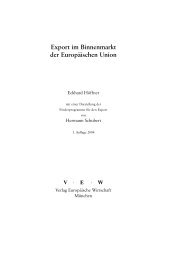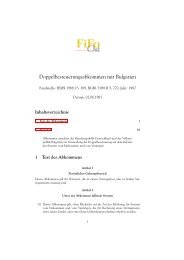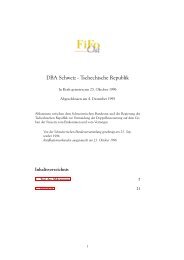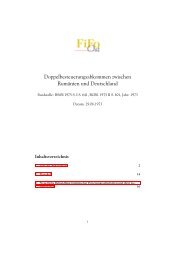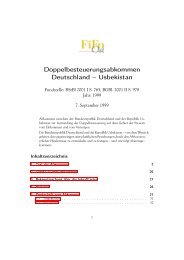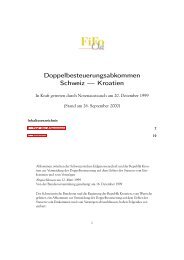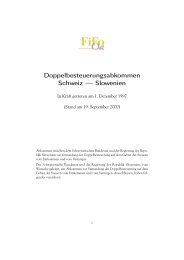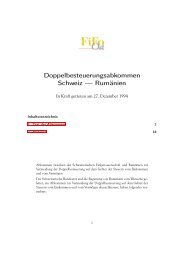EBRD activities in Ukraine - FiFo Ost
EBRD activities in Ukraine - FiFo Ost
EBRD activities in Ukraine - FiFo Ost
You also want an ePaper? Increase the reach of your titles
YUMPU automatically turns print PDFs into web optimized ePapers that Google loves.
Oil and gas supplies<br />
Russia currently exports about 125 billion cubic metres of gas to<br />
western Europe and 90 per cent of the gas export goes through<br />
Ukra<strong>in</strong>e. Rather than receiv<strong>in</strong>g cash for transit fees, Ukra<strong>in</strong>e has<br />
received free gas from Russia as payment. In recent years,<br />
however, Ukra<strong>in</strong>e has been unable to keep up with its payments<br />
for gas which it imports from Russia or for the transport fees<br />
for gas imported from other countries through Russia. The two<br />
countries have been at odds over the amount of Ukra<strong>in</strong>e's debt.<br />
Ukra<strong>in</strong>e's non-payment of debts has prompted Russia at various<br />
times <strong>in</strong> recent years to disconnect the country from its electricity<br />
grid, cut off gas and oil supplies, <strong>in</strong>vestigate ways for gas transit<br />
to by-pass Ukra<strong>in</strong>e, and even ask it to pay its energy debts by<br />
hand<strong>in</strong>g over state-owned enterprises <strong>in</strong> lieu of cash. High world<br />
oil prices have enticed Russian oil exporters to sell elsewhere,<br />
leav<strong>in</strong>g Ukra<strong>in</strong>ian ref<strong>in</strong>eries short of supplies.<br />
In December, matters were settled and agreements were signed<br />
on Russian gas deliveries for 2001 and the transit through Russia<br />
of Turkmen gas exported to Ukra<strong>in</strong>e. The agreement is a strong<br />
signal for foreign markets, <strong>in</strong> particular for possible <strong>in</strong>vestors <strong>in</strong><br />
Ukra<strong>in</strong>e's gas transportation system. The countries specified that<br />
Ukra<strong>in</strong>e will receive 30 billion cubic metres of gas from Russia as<br />
payment for transit, 30 billion from Turkmenistan and will produce<br />
18 billion cubic metres itself <strong>in</strong> 2001. Russia ensured the transit<br />
of Turkmen gas and offered Ukra<strong>in</strong>e an eight-year grace period <strong>in</strong><br />
its repayment of debt.<br />
Power distribution<br />
Last<strong>in</strong>g improvements <strong>in</strong> the power sector depend on the<br />
successful sale of the rema<strong>in</strong><strong>in</strong>g state shares <strong>in</strong> the Oblenergos<br />
to strategic <strong>in</strong>vestors. Seven of the 27 Oblenergos were already<br />
sold <strong>in</strong> 1998 and eventually came to be controlled by offshore<br />
companies widely believed to be f<strong>in</strong>ancial <strong>in</strong>vestors rather than<br />
strategic <strong>in</strong>vestors. The sales of the rema<strong>in</strong>der were to proceed<br />
via tenders <strong>in</strong> 2001, follow<strong>in</strong>g the appo<strong>in</strong>tment of a f<strong>in</strong>ancial<br />
adviser, Credit Suisse First Boston (CSFB), the first time a<br />
western advisor has been engaged to run a privatisation tender <strong>in</strong><br />
Ukra<strong>in</strong>e. The Oblenergos' privatisation with advisor assistance<br />
was a requirement of the IMF. From 51 to 75 per cent stakes of<br />
seven Oblenergos were on the privatisation list <strong>in</strong> 2000. One of<br />
the seven sales, of a 70 per cent stake <strong>in</strong> Mykolayivoblenergo,<br />
was postponed by a court dispute.<br />
CSFB recommended restructur<strong>in</strong>g of the Oblenergos' debt to<br />
creditors, adopt<strong>in</strong>g more flexible tariff-sett<strong>in</strong>g rules and cutt<strong>in</strong>g<br />
a long list of <strong>in</strong>vestment requirements for would-be buyers.<br />
Major sectors of the economy<br />
The tender was announced <strong>in</strong> late October. The government<br />
wanted to sell the six Oblenergos to western <strong>in</strong>vestors <strong>in</strong>stead<br />
of (offshore) local bus<strong>in</strong>ess groups, as with the first seven<br />
back <strong>in</strong> 1998, and therefore decided to ban offshore firms<br />
from tak<strong>in</strong>g part <strong>in</strong> energy privatisation. The law “On the<br />
Procedures for Hold<strong>in</strong>g Tenders on Sale of Shares of Energy<br />
Companies” was approved <strong>in</strong> September 2000. The successful<br />
sale of four out of the seven Oblenergos was one of the terms<br />
of the <strong>EBRD</strong>'s grant<strong>in</strong>g loans for completion of the<br />
construction of the power units at the Rivne and Khmelnytsky<br />
NNPs (see Nuclear energy below).<br />
The deadl<strong>in</strong>e for applications for Sevastopoloblenergo,<br />
Khersonoblenergo, Kirovohradoblenergo was 8 December. The six<br />
oblenergos were to be sold on 22 February and 1 March but the<br />
sale was postponed until April on the advice of the f<strong>in</strong>ancial<br />
advisor to allow the government more time to address some of<br />
the issues of concern to strategic <strong>in</strong>vestors. The State Property<br />
Fund issued a tender <strong>in</strong> January 2001 to select a f<strong>in</strong>ancial<br />
advisor to assist <strong>in</strong> privatisation of the next 12 Oblenergos.<br />
The government's immediate reform programme also <strong>in</strong>cluded<br />
substantial and last<strong>in</strong>g improvements <strong>in</strong> cash collection of<br />
payments for energy bills. Low cash payments have limited the<br />
ability of the generators to purchase fuel, have affected the<br />
efficiency of the wholesale market and have also contributed to<br />
the problems of non-monetary payments <strong>in</strong> the economy. In<br />
1999, while total payments by the distributors to the power<br />
market were about 80 per cent, less than 9 per cent were <strong>in</strong><br />
cash. Cash collection ratios rose, however, <strong>in</strong> 2000. In July 2000<br />
a law took effect to improve cash payments <strong>in</strong> the wholesale<br />
power market, which required power distribution companies to<br />
pay cash for the electricity they have contracted to purchase from<br />
the energy market, while the regulator determ<strong>in</strong>es the proportion<br />
of these receipts that will be paid to the generat<strong>in</strong>g companies.<br />
In August 2000 the collection rate was 70 per cent, the highest<br />
rate ever, as opposed to 10 per cent <strong>in</strong> January.<br />
Regional power distribution companies offered for sale <strong>in</strong> 2000<br />
Company Per cent of shares Start<strong>in</strong>g price Equivalent <strong>in</strong><br />
offered for sale (UAH millions) US$ millions<br />
Kyivoblenergo 75 174.03 31.99<br />
Rivneoblenergo 75 100.61 18.49<br />
Zhytomyroblenergo 75.56 95.17 17.49<br />
Sevastopoloblenergo 70 35.35 6.49<br />
Khersonoblenergo 65 111.49 20.49<br />
Kirovogradoblenergo 51 87.02 15.99<br />
Ukra<strong>in</strong>e Investment Profile 19



